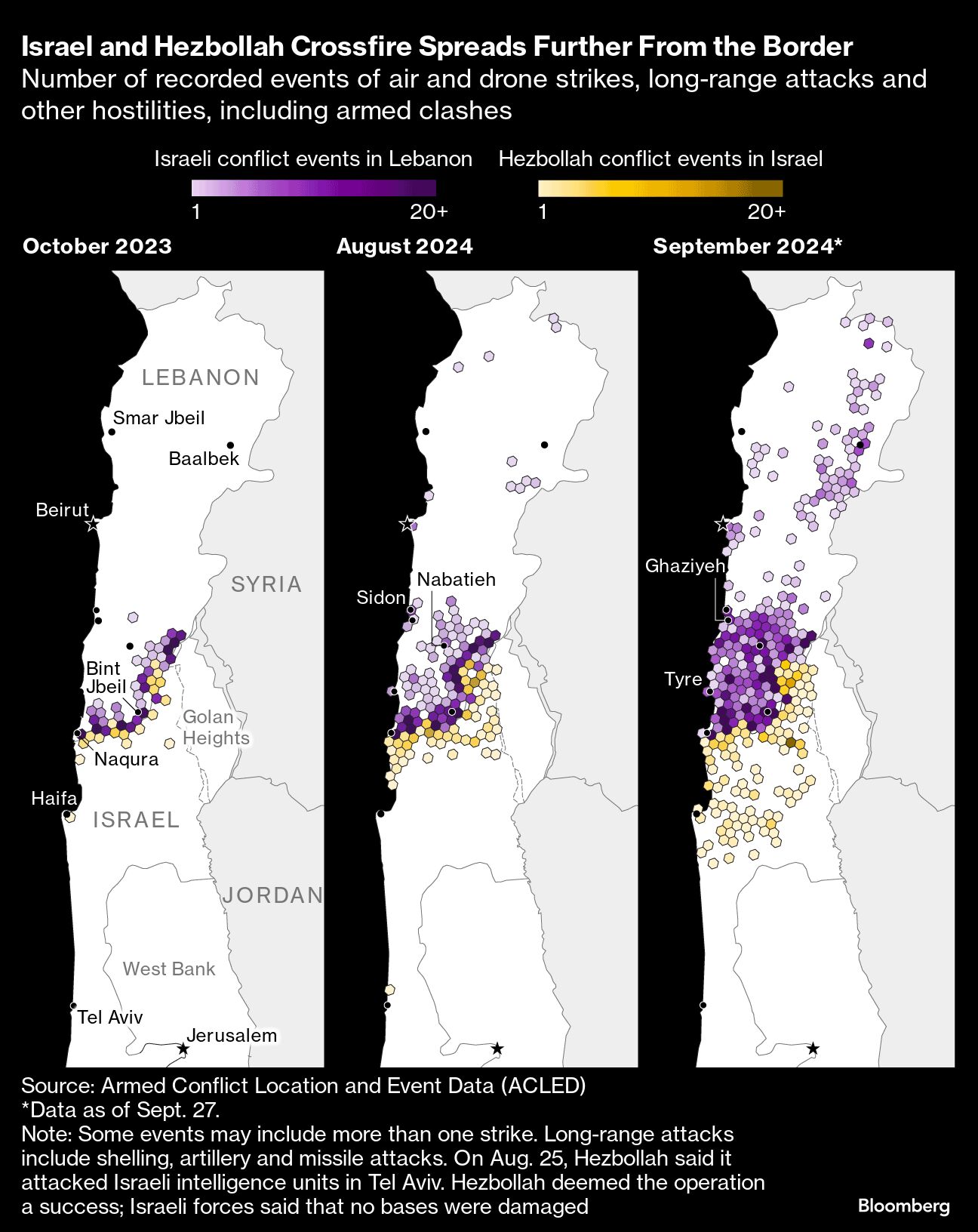
(Bloomberg) -- President Joe Biden sought to discourage Israel from attacking Iran's oil fields, as the US looks to shape Prime Minister Benjamin Netanyahu's response to a ballistic-missile barrage and keep the region from descending into all-out war.
Biden, addressing reporters at the White House, acknowledged that Israel would respond in some fashion, as Netanyahu vowed to do soon after Iran fired about 200 missiles at Israeli targets on Tuesday. But he's also sought to keep the prime minister from going too far, discouraging a strike on oil facilities and previously saying Israel shouldn't strike Iran's nuclear facilities either.
“The Israelis have not concluded what they're going to do in terms of a strike,” Biden said at the White House, adding that he didn't know when a response might come. “If I were in their shoes, I'd be thinking about other alternatives than striking oil fields.”
The comment was an acknowledgment that an Israeli attack on major oil infrastructure would be considered a significant escalation that would likely roil energy markets amid concerns supply might be choked off, especially to China. Oil pared gains after he spoke, with West Texas Intermediate rising 0.9% to settle above $74 a barrel, after earlier surging as much as 2.5%.
Biden got a sense for just how sensitive the markets have become a day before, when oil jumped by 5% off comments in which he said the US was “discussing” possible Israeli strikes on energy facilities. Overall, crude soared 9.1% this week — the biggest weekly advance since March 2023.
Donald Trump, the Republican presidential nominee, criticized Biden's approach during a town hall Friday night in North Carolina, saying he believed a retaliatory strike should be directed at Iran's nuclear sites.
“I think he got that one wrong,” the former president said, adding that the “answer should have been hit the nuclear first we'll worry about the rest of it later.”
Trump and Biden spoke as Israel kept up attacks on Lebanon's capital, Beirut, as well as the south of the country in its campaign against the Iran-backed militant group Hezbollah. Iran said it would support a conditional cease-fire if it involved both its allied groups — Hezbollah and Hamas, operating in Gaza.
Israel has stepped up a campaign to eliminate threats from Hezbollah after almost of year of trading cross-border rocket fire, killing much of its top leadership and sending troops into southern Lebanon for the first time since a 2006 war. The Israel Defense Forces said Friday it had killed 250 Hezbollah militants since Monday.
Biden said he was consulting with Netanyahu's government as it decides how to respond to Tuesday's attack, in which Iran fired about 200 ballistic missiles at targets across the country. While some of the missiles got through Israel's defenses, there was little damage. Netanyahu has warned Israel has no choice but to retaliate, and an attack could come at any time.

Israel has stepped up a campaign to eliminate threats from Hezbollah after almost of year of trading cross-border rocket fire, killing much of its top leadership and sending troops into southern Lebanon for the first time since a 2006 war. (Bloomberg)
Iran's Supreme Leader Ayatollah Ali Khamenei — leading Friday prayers in Tehran for the first time since January 2020 — told a huge crowd the Islamic Republic would strike again if necessary, having so far delivered the “minimum punishment” possible to Israel. He urged Arab and Muslim countries to unite against what he described as a common enemy.
“We'll neither hesitate nor rush in fulfilling our duties,” Khamenei said.
The US and other Group of Seven nations are weighing sanctions on Iran, which is already under smothering financial restrictions. Asked if the US was considering fresh sanctions on Iran's oil sector, Biden said “that's under consideration right now — the whole thing.”
Biden sidestepped a question on whether the looming US presidential election was potentially affecting Israel's decision-making — or whether Netanyahu was attempting to influence the outcome of the contest. Netanyahu had a warm relationship with former President Donald Trump, and some experts have suggested the Israeli leader is waiting to see who wins the presidency next month before considering a cease-fire.
“Whether he's trying to influence election or I don't know, but I'm not counting on that,” Biden said, adding that “no administration has helped Israel more than I have.”
Read More: Why the Israel-Iran Conflict Shapes the Middle East: QuickTake
Israel said its actions in Lebanon — more than 1,500 people have been killed in airstrikes in recent weeks and about 1 million have been displaced, according to Lebanese officials — are necessary to end a year of cross-border rocket attacks by Hezbollah. Those, carried out in solidarity with Hamas, have forced tens of thousands of Israelis to flee their homes in the north of the country.
Lebanon said 37 more people were killed by strikes on Thursday and more than 150 were wounded. As well as Beirut, Israeli jets struck south Lebanon, the Bekaa Valley in the north-east and the Mount Lebanon region in the north, the Lebanese health ministry said.
Essential Business Intelligence, Continuous LIVE TV, Sharp Market Insights, Practical Personal Finance Advice and Latest Stories — On NDTV Profit.




















